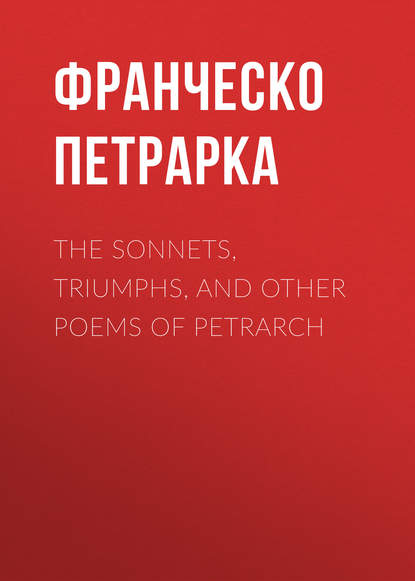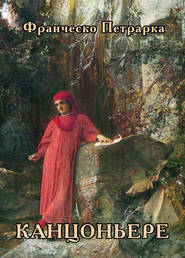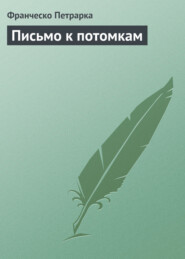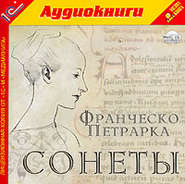По всем вопросам обращайтесь на: info@litportal.ru
(©) 2003-2025.
✖
The Sonnets, Triumphs, and Other Poems of Petrarch
Настройки чтения
Размер шрифта
Высота строк
Поля
And he, whom pleasures strove to lure in vain
From duty's path. And first in mournful mood
The mighty soul of Archimedes stood;
And sage Democritus I there beheld,
Whose daring hand the light of vision quell'd,
To shun the soul-seducing forms, that play
On the rapt fancy in the beam of day:
The gifts of fortune, too, he flung aside,
By wisdom's wealth, a nobler store, supplied.
There Hippias, too, I saw, who dared to claim
For general science an unequall'd name.
And him, whose doubtful mind and roving eye
No certainty in truth itself could spy;
With him who in a deep mysterious guise
Her heavenly charms conceal'd from vulgar eyes.
The frontless cynic next in rank I saw,
Sworn foe to decency and nature's modest law.
With him the sage, that mark'd, with dark disdain,
His wealth consumed by rapine's lawless train;
And glad that nothing now remain'd behind,
To foster envy in a rival's mind,
That treasure bought, which nothing can destroy,
"The soul's calm sunshine, and the heart-felt joy."
Then curious Dicaearchus met my view,
Who studied nature with sagacious view.
Quintilian next, and Seneca were seen,
And Chaeronea's sage, of placid mien;
All various in their taste and studious toils,
But each adorn'd with Learning's splendid spoils.
There, too, I saw, in universal jar,
The tribes that spend their time in wordy war;
And o'er the vast interminable deep
Of knowledge, like conflicting tempests, sweep.
For truth they never toil, but feed their pride
With fuel by eternal strife supplied:
No dragon of the wild with equal rage,
Nor lions in nocturnal war, engage
With hate so deadly, as the learn'd and wise,
Who scan their own desert with partial eyes.
Carneades, renown'd for logic skill,
Who right or wrong, and true and false, at will
Could turn and change, employ'd his fruitless pain
To reconcile the fierce, contending train:
But, ever as he toil'd, the raging pest
Of pride, as knowledge grew, with equal speed increased.
Then Epicurus, of sinister fame,
Rebellious to the lord of nature, came;
Who studied to deprive the soaring soul
Of her bright world of hope beyond the pole;
A mole-ey'd race their hapless guide pursued,
And blindly still the vain assault renew'd.
Dark Metrodorus next sustain'd the cause,
With Aristippus, true to Pleasure's laws.
Chrysippus next his subtle web disposed:
Zeno alternate spread his hand, and closed;
To show how eloquence expands the soul,
And logic boasts a close and nervous whole.
And there Cleanthes drew the mighty line
That led his pupils on, with heart divine,
Through time's fallacious joys, by Virtue's road,
To the bright palace of the sovereign good.—
But here the weary Muse forsakes the throng,
Too numerous for the bounds of mortal song.
Boyd.
THE TRIUMPH OF TIME
Dell' aureo albergo con l' Aurora innanzi
Behind Aurora's wheels the rising sun
His voyage from his golden shrine begun,
With such ethereal speed, as if the Hours
Had caught him slumb'ring in her rosy bowers.
With lordly eye, that reach'd the world's extreme,
Methought he look'd, when, gliding on his beam,
That wingèd power approach'd that wheels his car
In its wide annual range from star to star,
Measuring vicissitude; till, now more near,
Methought these thrilling accents met my ear:—
"New laws must be observed if mortals claim,
Spite of the lapse of time, eternal fame.
Those laws have lost their force that Heaven decreed,
And I my circle run with fruitless speed;
If fame's loud breath the slumb'ring dust inspire,
And bid to live with never-dying fire,
My power, that measures mortal things, is cross'd,
And my long glories in oblivion lost.
If mortals on yon planet's shadowy face,
Can match the tenor of my heavenly race,
I strive with fruitless speed from year to year
To keep precedence o'er a lower sphere.
In vain yon flaming coursers I prepare,
In vain the watery world and ambient air
Their vigour feeds, if thus, with angels' flight
A mortal can o'ertake the race of light!
Were you a lesser planet, doom'd to run
A shorter journey round a nobler sun;
Ranging among yon dusky orbs below,
A more degrading doom I could not know:
From duty's path. And first in mournful mood
The mighty soul of Archimedes stood;
And sage Democritus I there beheld,
Whose daring hand the light of vision quell'd,
To shun the soul-seducing forms, that play
On the rapt fancy in the beam of day:
The gifts of fortune, too, he flung aside,
By wisdom's wealth, a nobler store, supplied.
There Hippias, too, I saw, who dared to claim
For general science an unequall'd name.
And him, whose doubtful mind and roving eye
No certainty in truth itself could spy;
With him who in a deep mysterious guise
Her heavenly charms conceal'd from vulgar eyes.
The frontless cynic next in rank I saw,
Sworn foe to decency and nature's modest law.
With him the sage, that mark'd, with dark disdain,
His wealth consumed by rapine's lawless train;
And glad that nothing now remain'd behind,
To foster envy in a rival's mind,
That treasure bought, which nothing can destroy,
"The soul's calm sunshine, and the heart-felt joy."
Then curious Dicaearchus met my view,
Who studied nature with sagacious view.
Quintilian next, and Seneca were seen,
And Chaeronea's sage, of placid mien;
All various in their taste and studious toils,
But each adorn'd with Learning's splendid spoils.
There, too, I saw, in universal jar,
The tribes that spend their time in wordy war;
And o'er the vast interminable deep
Of knowledge, like conflicting tempests, sweep.
For truth they never toil, but feed their pride
With fuel by eternal strife supplied:
No dragon of the wild with equal rage,
Nor lions in nocturnal war, engage
With hate so deadly, as the learn'd and wise,
Who scan their own desert with partial eyes.
Carneades, renown'd for logic skill,
Who right or wrong, and true and false, at will
Could turn and change, employ'd his fruitless pain
To reconcile the fierce, contending train:
But, ever as he toil'd, the raging pest
Of pride, as knowledge grew, with equal speed increased.
Then Epicurus, of sinister fame,
Rebellious to the lord of nature, came;
Who studied to deprive the soaring soul
Of her bright world of hope beyond the pole;
A mole-ey'd race their hapless guide pursued,
And blindly still the vain assault renew'd.
Dark Metrodorus next sustain'd the cause,
With Aristippus, true to Pleasure's laws.
Chrysippus next his subtle web disposed:
Zeno alternate spread his hand, and closed;
To show how eloquence expands the soul,
And logic boasts a close and nervous whole.
And there Cleanthes drew the mighty line
That led his pupils on, with heart divine,
Through time's fallacious joys, by Virtue's road,
To the bright palace of the sovereign good.—
But here the weary Muse forsakes the throng,
Too numerous for the bounds of mortal song.
Boyd.
THE TRIUMPH OF TIME
Dell' aureo albergo con l' Aurora innanzi
Behind Aurora's wheels the rising sun
His voyage from his golden shrine begun,
With such ethereal speed, as if the Hours
Had caught him slumb'ring in her rosy bowers.
With lordly eye, that reach'd the world's extreme,
Methought he look'd, when, gliding on his beam,
That wingèd power approach'd that wheels his car
In its wide annual range from star to star,
Measuring vicissitude; till, now more near,
Methought these thrilling accents met my ear:—
"New laws must be observed if mortals claim,
Spite of the lapse of time, eternal fame.
Those laws have lost their force that Heaven decreed,
And I my circle run with fruitless speed;
If fame's loud breath the slumb'ring dust inspire,
And bid to live with never-dying fire,
My power, that measures mortal things, is cross'd,
And my long glories in oblivion lost.
If mortals on yon planet's shadowy face,
Can match the tenor of my heavenly race,
I strive with fruitless speed from year to year
To keep precedence o'er a lower sphere.
In vain yon flaming coursers I prepare,
In vain the watery world and ambient air
Their vigour feeds, if thus, with angels' flight
A mortal can o'ertake the race of light!
Were you a lesser planet, doom'd to run
A shorter journey round a nobler sun;
Ranging among yon dusky orbs below,
A more degrading doom I could not know:














